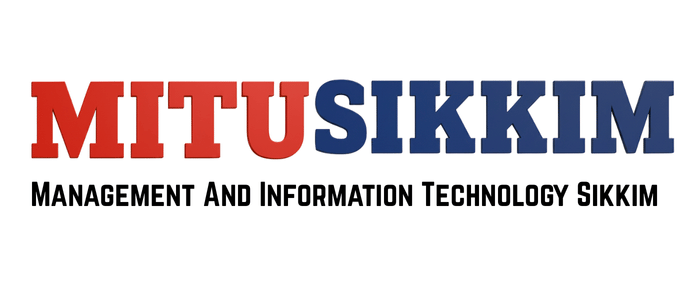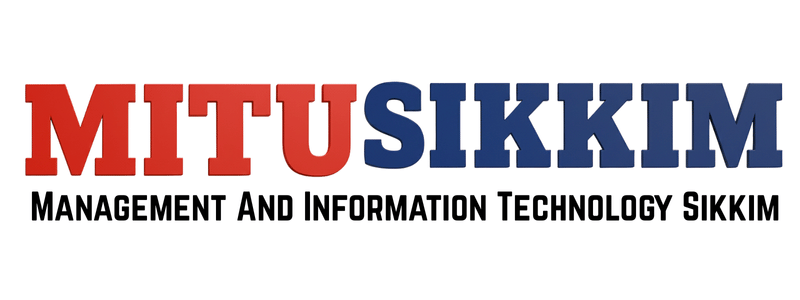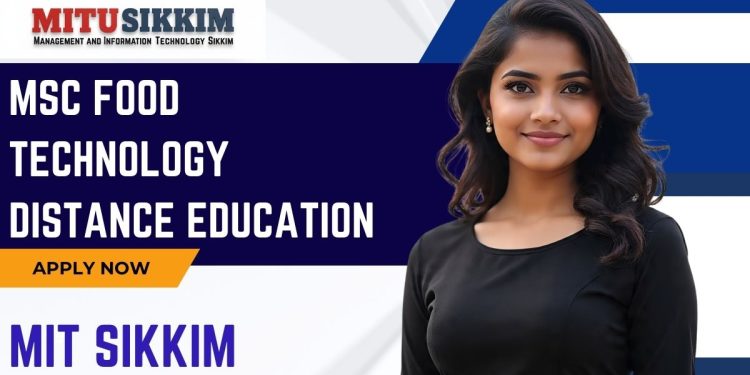MSC Food Technology Distance Education Admission is a specialized program focused on food processing, safety, and innovation. This two-year postgraduate course covers food chemistry, microbiology, processing techniques, and quality control. Application dates run from 20 September 2025 to 30 November 2025 for the 2025-26 academic year.
The program costs INR 58,500 for the entire duration and is approved by UGC-DEB. Students gain expertise in food preservation, packaging technology, nutritional science, and food safety regulations. Working professionals can continue their jobs while studying through the flexible distance learning mode.
MIT University Sikkim offers specialized modules in dairy technology, meat processing, beverage technology, and food biotechnology. The course prepares students for leadership roles in food manufacturing, quality assurance, research and development, and food safety management.
MSC Food Technology Distance Education Admission Process 2025-26
- Merit-based selection – Students get admission based on their undergraduate marks in relevant science subjects without entrance exams.
- Application fee of INR 1,000 is required during online registration, payable through UPI, debit card, or net banking options.
- Free counseling support from MIT Sikkim admission team helps students understand course structure, career prospects, and study materials.
- Document verification process includes checking original certificates during online submission or at designated centers across India.
- Final admission confirmation happens within 15 days of application submission with immediate access to digital study materials and online portal.
MSC Food Technology Distance Education Admission Overview
- Course prepares students for advanced roles in food processing industries, quality control laboratories, and research institutions.
- MIT Sikkim provides comprehensive study materials, online lectures, virtual lab simulations, and industry case studies for practical learning.
- Two-year duration with four semesters covers theoretical knowledge and practical applications in food science and technology.
- Flexible learning schedule allows students to balance work commitments with academic pursuits through weekend classes and online resources.
- Graduates find employment in food manufacturing companies, government agencies, research organizations, and can start their own food ventures.
What is MSC Food Technology Distance Education?
MSC Food Technology deals with the science behind food processing, preservation, and safety. Students learn about converting raw materials into safe, nutritious, and appealing food products. The program covers food chemistry, microbiology, engineering principles, and quality management systems.
Core subjects include food processing technology, food safety and hygiene, nutritional biochemistry, food packaging, and sensory evaluation. Students study fermentation technology, dairy science, meat and poultry processing, and beverage technology. The curriculum also covers food laws, regulations, and international quality standards.
Distance learning mode provides flexibility through online lectures, digital lab simulations, and virtual industry visits. Students receive practical training through industry internships and project work. The program develops skills in food analysis, product development, quality assurance, and food safety management.
Modern food technology focuses on sustainable processing methods, functional foods, and novel preservation techniques. Students learn about food biotechnology, nanotechnology applications, and clean label products that meet consumer demands.
MSC Food Technology Distance Education Admission Eligibility Criteria
- Bachelor’s degree in Food Technology, Food Science, Chemistry, Biology, Biotechnology, or any related science field from a recognized university.
- Minimum 50% aggregate marks in undergraduate studies for general category students, while SC/ST candidates need 45% marks.
- No entrance exam required – admission is purely merit-based on undergraduate performance and relevant work experience if applicable.
- Working professionals from food industry with relevant experience may get preference during the selection process at MIT Sikkim.
MSC Food Technology Distance Learning Fee
- Total program fee: INR 58,500 for complete two-year course, payable in installments across four semesters for student convenience.
- Registration fee: INR 1,000 (one-time) covers application processing, document verification, and initial study material access.
- Additional costs may include examination fees, practical session charges, and optional industry visit participation fees.
Benefits of Choosing MIT Sikkim MSC Food Technology
- Management and Information Technology University Sikkim is a UGC-recognized institution known for quality distance education programs and industry partnerships.
- Industry-relevant curriculum designed with input from food processing companies ensures graduates meet current market requirements and technology trends.
- Flexible study schedule allows working professionals to pursue higher education without leaving their jobs, with weekend classes and online support.
- Recognized degree holds the same value as regular programs, opening doors to government jobs, higher studies, and corporate positions.
- Comprehensive student support system includes online doubt clearing, digital library access, and career guidance from experienced faculty members.
How to Apply for MSC Food Technology Admission at MIT Sikkim
- Visit the official website https://mituniversitysikkim.com/ and navigate to the distance education section under admissions menu.
- Click on “MSC Food Technology” program and carefully read the detailed course information, eligibility criteria, and fee structure.
- Fill the online application form with accurate personal details, educational qualifications, and upload required documents in specified formats.
- Pay the application fee of INR 1,000 through secure payment gateway using credit card, debit card, UPI, or net banking.
- Submit the completed application form and download the acknowledgment receipt for future reference and admission status tracking.
- Wait for document verification confirmation and admission approval from the university admissions office within 10-15 working days.
- Upon selection, pay the first semester fee and gain access to online learning portal with study materials and class schedules.
- Complete the enrollment process by submitting original document copies and attending the orientation program conducted online.
Documents Required
- Class 12th mark sheet and certificate from recognized board showing science subjects with physics, chemistry, and biology/mathematics.
- Bachelor’s degree certificate and mark sheets of all semesters from UGC-recognized university with clear grade details.
- Transfer certificate from previous educational institution and migration certificate if changing university or state for studies.
- Category certificate (SC/ST/OBC) issued by competent authority if claiming reservation benefits during the admission process.
- Work experience certificate from current or previous employers if applying as a working professional with industry background.
- Passport size photographs (recent) and identity proof like Aadhar card, passport, or driver’s license for verification purposes.
Why Choose MIT Sikkim MSC Food Technology?
- Strong industry connections provide students with internship opportunities, guest lectures from professionals, and placement assistance in leading food companies.
- Comprehensive curriculum covers both traditional and modern food processing techniques, ensuring graduates are ready for diverse industry challenges.
- Online learning platform offers 24/7 access to recorded lectures, study materials, virtual labs, and interaction with faculty and peers.
- Affordable fee structure makes quality education accessible to students from different economic backgrounds without compromising on academic standards.
- MIT University Sikkim’s reputation in distance education ensures degree recognition by employers, government agencies, and higher education institutions.
- Growing food processing industry in India creates abundant career opportunities for qualified food technologists in manufacturing, quality control, and R&D sectors.
MSC Food Technology Career Prospects in Distance Learning
- Food Technologist positions in manufacturing companies with starting salaries ranging from INR 3.5 to 6 lakhs per annum.
- Quality Control Manager roles ensure food safety standards and earn between INR 4 to 8 lakhs annually in processing industries.
- Research and Development opportunities in food innovation labs with compensation packages of INR 5 to 10 lakhs per year.
- Food Safety Inspector government positions provide job security with salaries between INR 4 to 7 lakhs plus additional benefits.
- Production Manager roles in dairy, beverage, and processed food companies offer INR 6 to 12 lakhs annual packages.
- Nutritionist and Food Consultant positions in healthcare, hospitality, and wellness sectors provide flexible work options and good income.
- Entrepreneurial opportunities in food processing, catering services, and specialty food products with potential for significant returns.
MSC Food Technology Structure and Curriculum
| Semester | Subject Code | Subject Name | Credits |
|---|---|---|---|
| Semester 1 | FT101 | Food Chemistry and Biochemistry | 4 |
| Semester 1 | FT102 | Food Microbiology | 4 |
| Semester 1 | FT103 | Food Processing Technology-I | 4 |
| Semester 1 | FT104 | Food Engineering Principles | 4 |
| Semester 2 | FT201 | Food Safety and Quality Assurance | 4 |
| Semester 2 | FT202 | Dairy and Meat Technology | 4 |
| Semester 2 | FT203 | Food Processing Technology-II | 4 |
| Semester 2 | FT204 | Food Packaging and Storage | 4 |
| Semester 3 | FT301 | Food Biotechnology | 4 |
| Semester 3 | FT302 | Sensory Evaluation | 3 |
| Semester 3 | FT303 | Food Laws and Regulations | 3 |
| Semester 3 | FT304 | Research Methodology | 4 |
| Semester 4 | FT401 | Food Product Development | 4 |
| Semester 4 | FT402 | Industrial Training/Internship | 6 |
| Semester 4 | FT403 | Project Work | 8 |
Conclusion
MSC Food Technology Admission 2025 at MIT University Sikkim offers excellent opportunities for science graduates and working professionals to advance their careers in the growing food industry. With flexible distance learning, affordable fees of INR 58,500, and industry-relevant curriculum, students gain valuable skills in food processing, safety, and innovation.
The program’s merit-based admission process and comprehensive support system make it accessible to motivated learners. Graduates enjoy diverse career paths in manufacturing, quality control, research, and entrepreneurship with competitive salaries ranging from INR 3.5 to 12 lakhs annually.
For aspiring food technologists, MIT Sikkim’s MSC Food Technology program provides the perfect blend of theoretical knowledge and practical skills needed to succeed in today’s dynamic food processing industry.
FAQ
Q: What is the eligibility for MSC Food Technology at MIT Sikkim?
Students need a bachelor’s degree in Food Technology, Food Science, Chemistry, Biology, or related science fields with minimum 50% marks from a recognized university.
Q: How much does the MSC Food Technology distance course cost?
The total program fee is INR 58,500 for the complete two-year course, with additional registration fee of INR 1,000 during admission.
Q: Is there any entrance exam for MSC Food Technology admission?
No entrance exam is required. Admission is purely merit-based on undergraduate academic performance and relevant work experience if applicable.
Q: What are the career opportunities after MSC Food Technology?
Graduates can work as Food Technologists, Quality Control Managers, R&D specialists, Food Safety Inspectors, and Production Managers in various industries.
Q: Can working professionals pursue this course?
Yes, the distance learning mode is specifically designed for working professionals with flexible schedules, online classes, and weekend support sessions.
Q: What documents are required for MSC Food Technology admission?
Essential documents include bachelor’s degree certificates, mark sheets, transfer certificate, category certificate (if applicable), work experience certificate, and recent photographs.













